Physical Address
304 North Cardinal St.
Dorchester Center, MA 02124
Physical Address
304 North Cardinal St.
Dorchester Center, MA 02124

The Best and Latest in Conservative Thought

There’s no shortage of great Conservative Books because there’s no shortage of great Conservative thought.
From politicians to economists, philosophers to historians and theologians to pundits, Conservative thought forms the basis of the rights and freedoms Western society enjoys today, from individual rights, economic freedom, opportunity, limited government and a spirit of self-reliance.
“1984” – George Orwell
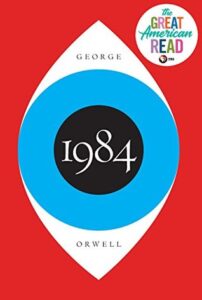
George Orwell might not have thought of himself as a Conservative but his contribution to the Conservative movement is undeniable. In fact, one can’t have a real discussion about politics and the media in today’s without understanding 1984 and the language of the book. Orwell invented the words used to describe how the Left operates and has given the Right an ability to recognize when Democrats are being tyrannical and call them on it.
Orwell’s Animal Farm is a more direct attack on the evils of Marxism but 1984 has had a tremendous cultural impact.
“Radical Son” – David Horowitz
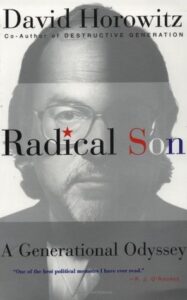
He left the Left. David Horowitz was an intellectual and activist for the most radical elements of Marxism in America. Then we switched sides. His autobiography explains why he made the transition and gives powerful insight into how the Left thinks and operates and what the Right needs to do to counter this attack on civilization.
“Righteous Indignation: Excuse Me While I Save the World” – Andrew Breitbart
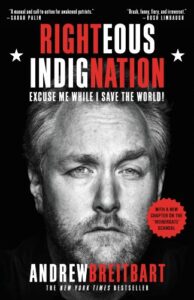
If you want to better understand modern populist Conservatism, how it rapidly rose to popularity, Andrew Breitbart’s “Righteous Indignation” is necessary reading.
In it, Breitbart lays out the tactics and philosophy behind sites like Breitbart.com, which take the battle to the Left not just in the political arena, but in all arenas.
“America Alone” – Mark Steyn
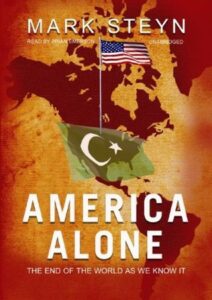
Europe is crumbling. America is the last hold out. This is not a post-apocalyptic novel, but reality. Mark Steyn details the terrifying reality that the West is declining, while at the same time managing to be both irreverent and at times even hilarious.
From Islamic extremism to unchecked borders, the West’s biggest issue isn’t a war but a cultural shift that’s being made possible by weak leaders who no longer believe in the founding principles of self-reliance, family and individual liberty.
We also recommend Pat Buchanan’s “The Death of the West,” although we find Steyn is a more entertaining read and more relevant to today’s world.
“The Conservative Mind from Burke to Eliot” – Russell Kirk (2001)
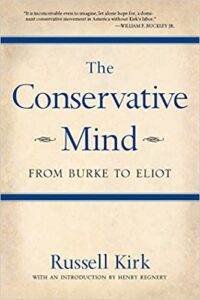
Originally published in 1953 it lays the groundwork of Conservative thought and principles.
“Capitalism and Freedom” – Milton Friedman
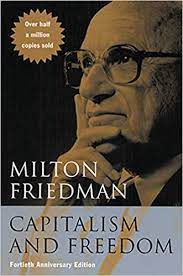
Capitalism is a dirty word in today’s schools. Students are taught its evil and promotes inequality. The reality is, inequality is natural. Milton Friedman hit the reset button on economic theory and created a reasoned argument for reduced government interference in the economy and increased reliance on the natural tendencies brought to light be Adam Smith in The Wealth of Nations. His theories were so persuasive they were adopted by global leaders like President Ronald Regan and British Prime Minister Margaret Thatcher, setting their respective countries on a course that was both more free and more prosperous.
“12 Rules for Life” – Jordan Peterson
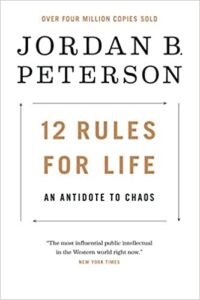
Conservatism puts the onus on the individual, prioritizing individual rights and laying the heavy burden of responsibilities and, ultimately, of success on them. And while the rights of the individual are at the core of America’s founding documents and institutions, reliance on self is at the core of the American Dream. Jordan Peterson speaks to a fundamental truth of the Conservative spirit, about the call to be better and that every individual has the ability to change their situation and the world around them if they just put their mind to it.
His book “12 Rules for Life” is both complex philosophically and psychologically, yet at the same time relies on practical and fundamental advice. In many regards it echoes truths about Conservative thought, namely, that there may be complex reasons behind these things, but the values are fundamentally understood by all.
It’s also inspiring, speaking to the core call-to-action of Conservative beliefs, that you have the power to change your life and the world around you.
“Facts Don’t Care About Your Feelings” – Ben Shapiro

The unofficial captain of the Conservative debate team, it’s not clear if Ben Shapiro is more famous for his “Facts Don’t Care About Your Feelings” tag line or his viral “Ben Shapiro Destroys X” YouTube videos.
This book is a collection of essays tackling all of the Ben’s favorite issues and those of the Conservative party. He uses logical arguments and loads of data to dismantle every Democrat argument there is. This non-nonsense book is a must-have for any Conservative, especially young ones, who want to shore up their arguments.
“Conservatism: An Invitation to the Great Tradition” – Roger Scruton
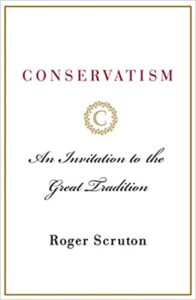
For those curious about what Conservatism really is, including everyone from opponents to proponents, Roger Scruton’s book is both a history lesson and a call to action.
From the emergence of modern Conservatism with the likes of John Locke, Thomas Hobbes and Adam Smith, to more modern thinkers like Milton Friedman this book shows how great ideas brought about great actions.
It will help you understand the tie between Conservatism and the foundation of modern Western society, from the rights of the individual to the rule of law.
Plus, it details the concrete impacts the ideals of Conservatism have had on leaders like Ronald Reagan and Margaret Thatcher and more.
The Black Book of Communism
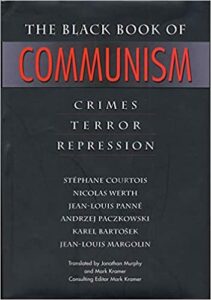
To know Conservatism is to know what it’s up against, and there’s no ideology more fundamentally opposed to Conservative values than the Marxist theories of Communism.
Communism has been tried. Again. And again. And again.
The Black Book of Communism is a terrifyingly stark account of the human wasteland that is the practical application of this ideology across almost 100 years.
“Revolutions, like trees, must be judged by their fruit,” Ignazio Silone once wrote, and this book judges Communism by is results, recounting, in detail the death, torture, famine, massacres and ruined lives of millions.
From 1.7 million dead in Cambodia, to 25 million in Russia and as many as 65 million in China. And it goes on.
A detailed recounting of the wrongs, this books authors also explain how in every single country where the ideology of Communism was tried, it resulted in oppression, terror and death.